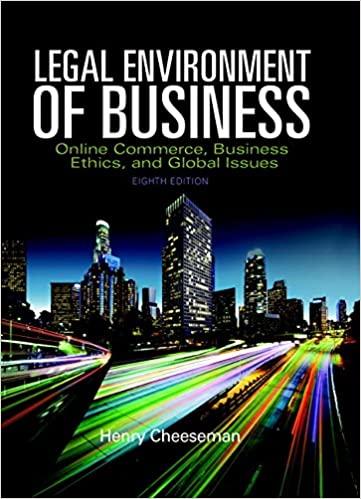Question
Read the following scenario: A new jewelry company based in Pennsylvania, Planted, is about to launch a diamond alternative. Their diamond alternative, the ORGood Diamond
Read the following scenario:
A new jewelry company based in Pennsylvania, Planted, is about to launch a diamond alternative. Their diamond alternative, the "ORGood Diamond" ("ORG Diamond" for short), is marketed as an "organic" and "morally good" alterative to mined diamonds. Mined diamonds are gems excavated by miners directly from the earth. The price of a mined diamond can range anywhere from several hundred dollars to several million dollars depending on the clarity, cut, and carat of the diamond. Unfortunately, miners suffer harsh and dangerous work environments, and mining can have irreversible impacts on the environment. Planted wanted to create an economically and environmentally sustainable alternative to a mined diamond. The ORG Diamond will be substantially lower in price and will have no negative impact on the environment, all while having the same appearance as a mined diamond. For example, a mined diamond costing $1,000 would go for $100 as an equivalent ORG Diamond.
The ORG Diamond is not a new concept. Lab-grown diamonds are increasingly popular among younger generations as a diamond alternative. What makes an ORG Diamond unique is their plant-based composition. They are 100% made from plants and are grown directly in the Planted store. No two ORG Diamonds are alike. Through their advanced technology of heat compression, Planted can make an ORG Diamond out of any plant or combination of plants. This means clients can bring in their own plants to create their own unique ORG Diamond.
The CEO of Planted recently submitted a patent application with the U.S. Patent and Trademark Office for intellectual property rights of the ORG Diamond as well as the heat compression technology. Those intellectual property rights include the exclusive rights of licensing, distribution, and marketing. In order words, the company would receive exclusive economic rights to their product and procedure.
During an interview about the future of jewelry, the CEO of EarthMonds, the largest jewelry company specializing in mined diamonds, accused Planted of economically profiting off plants. The CEO said, "I don't understand why so many people are praising this company as the so-called future of jewelry. The price of a mined diamond is expensive, sure, but you are paying for hundreds of hours of labor into mining and cutting one of earth's rarest stones. An ORG Diamond is just plants! It seems like you bring in $10 worth of basil and cilantro and end up paying 10 times that amount. It's ridiculous."
The following day, the CEO of Planted heard the interview and responded with a comment on their website, stating, "Here at Planted, we are not economically profiting from plants. We are creating an economically and environmentally sustainable alternative to mined diamonds. If anything, those companies selling mined diamonds are economically profiting off the earth." The feud between the companies attracted attention on social media.
- You are a writer for the Pennsylvania Business Reporter specializing in new and developing businesses. Your supervisor asked that you write a short piece on the Planted and EarthMond feud and include information on property rights, capitalism, labor theory, and/or Locke and Marx. Draft a short story in 100-200 words.
Step by Step Solution
There are 3 Steps involved in it
Step: 1

Get Instant Access to Expert-Tailored Solutions
See step-by-step solutions with expert insights and AI powered tools for academic success
Step: 2

Step: 3

Ace Your Homework with AI
Get the answers you need in no time with our AI-driven, step-by-step assistance
Get Started


